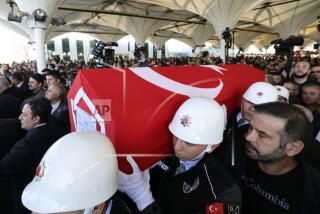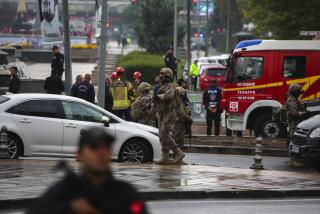Top Turkish Party Backs Bomb Probe
- Share via
ANKARA, Turkey — The ruling party on Tuesday joined the opposition in demanding a parliamentary inquiry into a bombing allegedly carried out by Turkish security forces against a bookstore patronized by Kurdish nationalists.
The attack last week in the southeastern town of Semdinli sparked violent protests throughout Turkey’s predominantly Kurdish provinces and raised fresh concerns among European Union officials about the country’s eligibility to join the 25-member alliance.
In its call for an inquiry, the ruling Justice and Development Party said the bombing raised “many questions in terms of how it occurred and the people said to be behind it.”
Turkish Prime Minister Recep Tayyip Erdogan renewed pledges Tuesday to pursue the investigation “as far as we can take it.”
“Whoever is found to be responsible, regardless of who they might be, will be punished,” he said at a news conference.
Allegations that rogue elements in the security forces were involved in the bombing emerged Nov. 9 after angry residents of Semdinli chased down and tried to lynch three men suspected of planting the bomb that killed two people and wounded more than a dozen.
The suspects turned out to be intelligence agents of the gendarmerie, or paramilitary police. The force was frequently accused of human rights abuses against civilians during the 1990s at the height of a separatist Kurdish insurgency led by guerrillas of the Kurdistan Workers Party, or PKK.
Two of the suspects, both members of the gendarmerie, claimed they were at the site of the bombing by chance. They were released Sunday for lack of evidence. The third, a civilian and a former PKK rebel-turned-police informant, was charged with involvement in the blast.
A military sergeant who allegedly opened fire and killed a man in the crowd that attempted to lynch his colleagues is facing separate charges of abuse of authority and excessive use of force.
All four men deny involvement in the bombing. The gendarmerie forces commander, Gen. Fevzi Turkeri, has sought to downplay the incident as a “local affair.”
The PKK resumed its armed insurgency in June 2004 after a five-year lull that followed the capture of its leader, Abdullah Ocalan. Violence in the southeast has been escalating over the last year. But mindful of Turkey’s EU aspirations, the army has largely refrained from resorting to the heavy-handed tactics it used to suppress the insurgency.
Some observers speculated that hawks within the military who oppose Turkey’s EU membership drive were seeking to escalate tensions with the Kurds in the hope of provoking a harsher military response, which in turn would draw the ire of the EU. The alliance, which opened membership talks with Turkey early last month, has long cited lack of civilian control over the military together with the country’s poor human rights record as obstacles to its entry into the EU.
“This act of provocation was staged by those who do not wish Turkey to move forward,” Interior Minister Abdulkadir Aksu said.
The legislature, which is dominated by Erdogan’s party, is not expected to vote on whether to conduct an inquiry until next week.
Opposition lawmakers who launched their own investigation have charged that the suspects’ car was registered under the local gendarmerie command and contained three Kalashnikov assault rifles, two grenades and a map pinpointing the bombed bookstore.
Esat Canan, an opposition deputy from Hakkari province, where Semdinli is located, who traveled to the town within hours of the bombing, said the car also contained a list of names of 105 “potential targets” that included Seferi Yilmaz, the owner of the bookshop. “I saw the list and my name had a red X drawn through it,” Yilmaz told the daily Radikal.
Western diplomats and rights activists, meanwhile, said they were encouraged by Erdogan’s promise to pursue an aggressive investigation into the bombing. They said the incident had become a major test of the government’s ability to assert control over the country’s powerful armed forces and make the military more transparent and accountable.
“It’s a huge challenge, and if he succeeds in bringing the perpetrators to justice, his [Erdogan’s] credibility will be enhanced not only in Turkey but in the EU as well,” said a Western diplomat who requested anonymity, as is common when sensitive issues are involved. “More importantly in the long run, he will gain the trust of the Kurds.”
The parliamentary call for an investigation came as more than 1,000 Kurds protesting the bombing clashed Tuesday with police in the town of Yuksekova, northwest of Semdinli. Four demonstrators died when police backed by tanks and armored personnel carriers opened fire on the crowd. Another died when a police vehicle was overturned during the clash.
More to Read
Sign up for Essential California
The most important California stories and recommendations in your inbox every morning.
You may occasionally receive promotional content from the Los Angeles Times.













